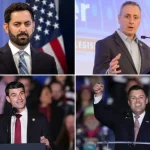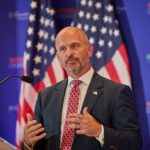
SAN FRANCISCO — Taiwan‘s representative at the Asia-Pacific Economic Cooperation summit welcomed President Joe Biden‘s meeting with Chinese President Xi Jinping.
But with Taiwan remaining one of China’s top investors, Dr. Morris Chang bristled at questions regarding the island’s economic dependence on its neighbor as it seeks military support from the United States amid cross-strait tensions.
BIDEN TRIES TO SELL BIDENOMICS ON WORLD STAGE WHEN VOTERS AREN’T BUYING IT
“You should ask an economic official that, a Taiwan economic official that,” Chang told the Washington Examiner on Friday on the sidelines of the APEC summit concerning the latter.
Concerning Biden’s meeting with Xi, Chang, who is representing Taiwanese President Tsai Ing-wen, contended it would likely increase stability across the Taiwan Strait, joking that “without peace, we wouldn’t have any supply chains.”

“Xi Jinping and Biden had a good meeting,” he said. “It tends to relax the tension, it reestablished the communication channel, and I think it’s a good thing.”
Chang did not have a formal meeting with Biden during the APEC summit, but he described his interactions with the president as “social” and of a “humorous nature.” He did sit down with Vice President Kamala Harris for about 30 minutes, in addition to engagements with Secretary of State Tony Blinken and White House National Economic Council Director Lael Brainard. While Chang spoke with about 10 other APEC counterparts, he did not talk to Xi or any member of China or Hong Kong’s delegation.
“With Secretary Blinken, I mainly conveyed our strong desire for regional peace and prosperity and also, to some extent, our very strong desire for increasing the supply chain resiliency,” he said.
Chang, who founded the Taiwan Semiconductor Manufacturing Company before retiring in 2018, additionally dismissed speculation Biden’s domestic investment in the chip industry will undermine Taiwan’s dominance in the sector and the U.S.’s willingness to defend its ally against China if needed.
CLICK HERE TO READ MORE FROM THE WASHINGTON EXAMINER
“You’re talking about the CHIPS Act?” the engineer and businessman asked. “I think it was $52 billion. About $39 billion is for subsidies for investment [over several years]. … If you compare both numbers to the capital investments that only just TSMC makes, TSMC makes, on the average, $37 billion a year.”
“For the U.S. to establish manufacturing capacity that is equivalent to TSMC is almost impossible in the U.S. in the short term, so in the short term, it will not happen,” he said.






